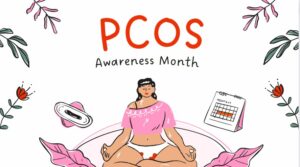
Fertility doctor speaks out about PCOS – a condition that affects 1 in 10 women – to battle the rise of health misinformation on TikTok
Research has found that the #pcosproblems has more than 353.9M views on TikTok. Social media users are being warned that the platform is rife with misinformation and could be damaging to those who might be suffering from Polycystic Ovary Syndrome (PCOS).
PCOS is a very common issue with 1 in 10 women in the UK affected by the condition. However, more than half of these women don’t have any symptoms, meaning they might suffer undiagnosed.
Dr Gill Lockwood, PCOS expert and Consultant Fertility specialist at Fertility Family shares her take on the most common myths circulating on PCOS and the truth behind the statements so that women can manage their symptoms more effectively.
“You did something to cause it”
Individuals are being blamed for their PCOS diagnosis and told that losing weight will ‘cure’ the condition. Several commenters on TikTok appear to have previously believed these myths, highlighting how important PCOS education is.
“The exact cause of PCOS is unknown, however, it’s clear that women aren’t responsible for having it and whilst losing weight may ease symptoms, it won’t cure the condition. PCOS can run in families which suggests that genetics certainly have a role to play.”
“PCOS is a rare condition”
PCOS being an unusual condition is a common myth. Many viewers have commented how themselves and countless people they know suffer from PCOS, actually making it extremely common.
“PCOS affects about 1 in every 10 women in the UK, making it one of the most common conditions impacting fertility in reproductive age women. PCOS may be considered rare due to the fact that half of the women that have the condition aren’t always diagnosed correctly or suffer any symptoms.
If not properly managed or left undiagnosed, it can lead to additional health problems in later life. For example, Type II diabetes is a significant long-term health risk that affects 50% of women with PCOS. If you suffer from symptoms such as: period problems, weight issues, acne, unwanted hair growth or frontal hair balding, this could be a sign of PCOS”.
“If you lose weight you can get rid of PCOS”
One of the most popular myths is that losing weight will get rid of PCOS. Unfortunately, many women have bought into this idea, looking for ways to ‘reverse’ PCOS by losing weight.
“Weight gain can be a common symptom of PCOS and your doctor will likely recommend losing weight to improve your condition. The NHS has said that a weight loss of just 5% can significantly improve PCOS. However, losing weight will never cure PCOS and gaining weight doesn’t cause PCOS either. It’s important to understand that not all women with PCOS have weight issues but they still suffer from irregular periods, acne and excessive hair growth.
Losing weight for ladies with PCOS is not as easy as it is for those without it. A combination of insulin resistance and a disrupted gut microbiome can make it really hard work. As a result, women with PCOS are more likely to develop eating disorders such as bulimia so it’s vital that they seek support. ‘Crash dieting’ is a disaster for women with PCOS as they’re likely to rapidly regain lost weight (and more) when a normal diet is resumed.”
“You can’t get pregnant if you have PCOS”
PCOS does have an impact on fertility which can make it harder for some women to get pregnant. However, many users on TikTok have previously heard that they won’t be able to get pregnant:
“Women with PCOS may take longer to conceive due to irregular periods which results in unpredictable ovulation. However, women with PCOS mustn’t believe that they can’t get pregnant or that they’ll require IVF. Reversing insulin resistance, reducing stress, following an anti-inflammatory diet and PCOS supplements can all help women with PCOS conceive.”
“You’ll have an insulin resistance”
Many people with PCOS problems have taken to TikTok to share their experiences with insulin resistance but this isn’t a universal feature of PCOS.
“Women with PCOS are often insulin resistant as their bodies can’t always use it effectively which can increase the risk of type 2 diabetes. However, insulin resistance isn’t guaranteed if someone has PCOS, this isn’t always the case.”
What to do if you think you may have PCOS
If you think you might have PCOS, book an appointment with your GP and list the symptoms you’ve been experiencing.
These myths and assumptions have been backed up by a medical specialist.
About Fertility Family
Fertility Family is dedicated to providing information and products that help increase the chances of having a baby. Fertility Family was started by Pharmasure, which has been in the field of fertility for over 20 years, and is partnered with Fertility Network UK and the British Fertility Society. Using their experience in the field, they have found carefully formulated products that have gone through clinical trials and are scientifically proven to help improve the chances of having a baby.








